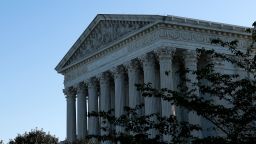A Texas billionaire and GOP megadonor paid boarding school tuition for Supreme Court Justice Clarence Thomas’ grandnephew, and the justice did not report the financial assistance for the child he helped raised on his annual disclosures, according to a new ProPublica report – the latest revelation raising ethical questions around the high court.
The ProPublica report on Thursday revealed that the billionaire Harlan Crow paid tuition for Mark Martin, who lived with Thomas’ family as a child and for whom the justice became a legal guardian. ProPublica cited a 2009 bank statement and an interview with a former administrator at the Georgia boarding school Martin attended.
The former administrator at the school, Hidden Lake Academy, told ProPublica that Crow paid for Martin’s tuition for the year or so Martin was at the boarding school. The administrator said, according to ProPublica, that he had been told by Crow that Crow also paid for Martin’s tuition at another school, the Randolph-Macon Academy in Virginia, which is Crow’s alma mater.
A statement from Crow’s office did not address the payments for Martin’s tuition directly but said that he and his wife had “supported many young Americans through scholarship and other programs at a variety of schools, including his alma mater.”
A friend and defender of Thomas, conservative lawyer Mark Paoletta, said on Twitter that Crow paid for the first year that Martin spent Randolph-Macon Academy and for the year he spent at Hidden Lake. Paoletta denied that Thomas ran afoul of the court’s financial disclosures rules by not reporting the payments, arguing that Martin did not qualify as a legal dependent under the federal ethics law in question.
However, on the justice’s 2002 financial disclosure submission, Thomas reported as a gift $5,000 from another couple that was characterized as an “Education gift to Mark Martin.”
The Supreme Court’s press office did not respond to requests seeking comment from the court and Thomas.
ProPublica previously reported that for years, Thomas has accepted lavish trips and gifts from Crow, which have gone mostly unreported on the justice’s financial disclosures, and that Crow also purchased several real estate properties, including the home where his mother lives, from the Thomas family.
The extent to which these transactions and hospitality should have been reported by Thomas has been the subject of debate among judicial ethics experts, who have noted that a recently-closed loophole for certain “personal hospitality” may have covered some of the luxury trips.
Thomas has said he followed the advice of others in deciding what required disclosure, and a source close to Thomas previously told CNN that the justice plans to amend his disclosure forms to reflect the real estate transaction, which also went unreported. Thomas also said in a statement last month that Crow “did not have business before the court.”
Nevertheless, court reforms advocates and Democratic lawmakers say that Thomas’ conduct shows that the current ethics rules for the justices – who are not subject to a code of conduct akin to the standards imposed on lower courts – are too lax.
Amid the ethics firestorm, which included a Senate hearing this week, Chief Justice John Roberts and the other eight justices released a “Statement on Ethics Principles and Practices” last week that the court’s critics say did not go far enough to address their concerns.
“Today’s report continues a steady stream of revelations calling Justices’ ethics standards and practices into question,” said Senate Judiciary Committee Chairman Dick Durbin in a statement on Thursday. “I hope that the Chief Justice understands that something must be done – the reputation and credibility of the Court is at stake.”
Republicans have pushed back on Democrats’ calls that Congress step in to enact stricter ethics rules for the justices, but some GOP lawmakers have acknowledged they’d like to see the high court – on its own – take steps towards greater transparency.
Asked Thursday about the latest ProPublica report, Sen. Mitt Romney said, “I hope they’ll look – they’ll evaluate.”
“I have no way of knowing the accuracy of that report and what’s been done but it clearly justifies taking a good look at it,” the Utah Republican said.
Sen. Thom Tillis, a North Carolina Republican who sits on the Senate Judiciary Committee, said he wasn’t going to speak to the specifics of the new allegations against Thomas, “because I could sit here and talk about other instances from other justices that the fact patterns are similar.”
“Which goes back to the point of the Supreme Court should address this and they should address it on a consensus basis,” Tillis said.
Ethics experts who spoke to ProPublica also acknowledged that the tuition payments, if considered a gift to Martin, may not have required disclosure. But since Thomas was Martin’s legal guardian, according to ProPublica’s report, he would have had responsibility for the child’s education and the tuition could also be viewed as an unreported gift to the justice himself.
The statement from Crow’s office said that that the tuition he and his wife has provided for young people “is given directly to academic institutions, not to students or to their families.”
“These scholarships and other contributions have always been paid solely from personal funds, sometimes held at and paid through the family business,” the statement said. “It’s disappointing that those with partisan political interests would try to turn helping at-risk youth with tuition assistance into something nefarious or political.”
CNN’s Manu Raju and Morgan Rimmer contributed to this report.






